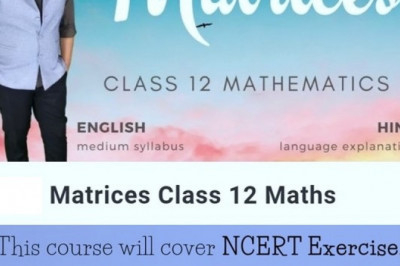views

How to Write an Effective Cover Letter
Job hunting is not exactly an entertaining activity. Combining job listings on several sites, modifying your resume, and prepping for tiring interviews, that's the everyday story of any job seeker. While all these are tiring for many of us, writing an effective cover letter is the most mind-numbing. With several conflicts and biased opinions, it's hard to decide what to include in a cover letter. Every time you sit down to format a cover letter, you search for templates online and gaze through it thinking, "Do I even need to submit a cover letter?", or "does anyone read this when I have my resume attached to the application?"
Yes, absolutely. Cover letters are of utmost significance when it comes to hiring processes. As a matter of fact, most hiring managers consider the cover letter as a necessary document to analyze a candidate's credibility.
A well-written cover letter will help you stand out from the crowd of job applicants as you prepare for your next job interview. Learn how to write a cover letter to convince a prospective employer that you are the best candidate for a particular position.
Cover Letter - What is it?
A cover letter is a document that goes with your job application and portrays you in a more personal way, summarizing your work experience, complementing the information on your resume or CV by focusing on your talents and achievements, and emphasizing a few of your most notable career accomplishments.
Why is it necessary?
A survey conducted by ResumeGo found that more than 80% of hiring managers & recruiters go through cover letters.
Cover letters were invented to persuade recruiters to look at your resumes. However, with changing times, cover letters must be properly formatted, succinct, and compelling to the recruiter, as most of them prioritize reading them before going through your resumes. Not only do cover letters effectively make a strong case for you as a prospect, but they can also reveal crucial data to recruiters and hiring managers since you took the effort to write one at all.
What to consider while writing a cover letter?
Conduct comprehensive research
Research before you start writing a cover letter for a job application. I am not just asking you to read through the job description. Take the extra step and research the company, its social media accounts, LinkedIn, and employee profiles. It does sound hectic and extreme, but it is critical if you need a competitive edge over the other potential candidates.
It will help if you understand the company's tone and can give you an advantage in writing your cover letter. You can even reach out to someone through LinkedIn or email regarding that position and use them as a reference in your cover letter. It's not always possible to get hold of someone, but it's worth a shot.
Start with something catchy
You can ask in your circle about their cover letters, and most of them would start with "I am applying for the X position which I saw on the Y platform…". That's how most cover letters are - boring. Instead, write something attractive. Start off your cover letter with a punchline, or lead with a robust opening sentence that compels the reader to continue. Tell them how excited you are to apply and what expertise you bring to the table. You can start with something like:
-
Let me introduce the two favorable qualities that make me a great addition to your organization.
You can craft something similar for your personalized cover letter for your next job application.
Deliver your enthusiasm
Hiring managers are interested in candidates that showcase their passion for learning and working. Most candidates get rejected because of their lack of enthusiasm rather than their skills. Employers want excitement in the 21st century. If you are seeking a job, show them that you are excited and enthusiastic, because unlike traditional methods of employment, working in the 21st century is pretty exciting, believe it or not.
Deliver that enthusiasm through your cover letter.
Keep it brief
Although most professionals advise finishing your cover letter within a page, try to complete it 3/4th of an A4-sized page. It should be short but concise. Your content must be easy to read, understand, and analyze. The recruiters or the hiring managers give a cursory glance at your resume and cover letter, considering there are hundreds of applications.
What to include in a cover letter
Your details and contact information
Make sure to enter your personal details and contact information at the top of the letter. If you are applying online, mention it in the signature box provided below.
Maintain proper formatting
As it is called a letter, it is critical to follow relevant formatting. Mention the details of the company, the hiring manager, and the company address at the top left corner of the letter, right before the opening sentence. Also, use salutations instead of the first name such as "Dear Mr. ___". Followed by their last name as it is widely used across industries. Being too formal also creates awkwardness; hence, be humble.
Opening, body paragraph, and closing
Start with a punchline and get the employer's attention. Apart from that, you could start with your reference for that specific company. Then, introduce yourself and mention why you would be a great fit for their organization in the opening paragraph. Back that bold statement by stating the experience and accomplishments you gained in your previous organizations or university/college. Write about 1-2 paragraphs about the same and move on to the problems you can solve for the company. Re-emphasize the reason you mentioned in the opening paragraph and back it up with solutions that you can bring to the table if you are hired. This shows that you have a problem-solving mindset. At the end of the cover letter, a closing statement is necessary as it is your last chance to put some words that could convince them to call you. Common closing phrases include "Sincerely" or "Regards". At the end of your cover letter, include your signature for the hard copy. An electronic signature is fine if you are mailing it to the recruiter or a hiring manager.
The Most Important Part- Proofreading your entire work
When you have finished writing your cover letter, ensure that you proofread it thoroughly. Check out any grammatical or spelling errors that you can find. Once you are done proofreading, ask someone to recheck it for you. You don't want to leave any chances of your application getting rejected because of some typos. Most candidates avoid it and wonder why their applications are getting rejected. It plays a significant role in clearing through the screening process and getting called for an interview.
Again, when combined with your resume, a well-written cover letter will help you land the job you have always wanted. Invest your time and ensure you present yourself in the best perspective possible to the employer.
If you need any assistance regarding your job hunting, ITPathfinder is here to help. We offer our services to international students seeking career growth or planning for a career change. Contact us today to launch the winning game plan for your desired job.













